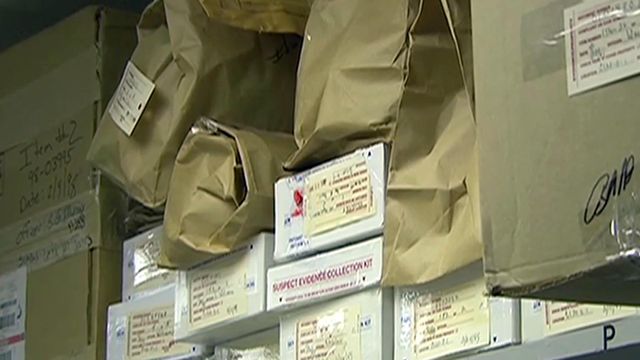Proposed legislation would pay to test old rape kits in NC
A bill backed by Democratic Attorney General Josh Stein and key Republican lawmakers would provide funding to test thousands of rape kits that have been sitting in law enforcement evidence rooms across North Carolina for years and establish protocols to ensure such backlogs don't recur in the future.
Posted — Updated"Untested sexual assault kits ... represent one of the biggest threats to public safety we face in this state," Stein said at a news conference. "Each one of these kits represents a personal tragedy, and each of those victims deserves justice."
The State Crime Lab doesn't have the capacity to handle the old kits while keeping up with the 20 kits submitted during an average week now, he said. So, law enforcement agencies need to send the old kits to outside labs, where DNA testing costs about $700 per kit.
As of a year ago, the Durham Police Department had the largest number of untested kits, at 1,711. The Raleigh Police Department had 1,428 untested kits, which was the second most.
By comparison, the Charlotte-Mecklenburg Police Department had only 499 untested kits.
"The Durham Police Department follows the protocols set by the State Bureau of Investigation’s Evidence Guide. We are currently going through our untested kits and submitting the ones that need to be tested," department spokesman Wil Glenn said.
"The number of untested kits dates back several years. Representatives from the Raleigh Police Department recently met with the SBI to move forward in submitting the kits," department spokeswoman Laura Hourigan said.
In addition to money for testing, the Survivor Act would require law enforcement agencies to send rape kits in future cases to an accredited lab for testing within 45 days.
"Every day a kit sits up there [in evidence] and a potential serial rapist is on the street is another day that that person could commit an awful crime," Stein said.
The bill is being co-sponsored by Sen. Warren Daniel, R-Burke, the chairman of the Senate Judiciary Committee, and Rep. Jamie Boles, R-Moore, who chairs the House Justice and Public Safety Appropriations Subcommittee.
Boles said the measure would prioritize testing rape kits where victims want to pursue criminal charges. Rep. Carson Smith, R-Pender, another co-sponsor, said groups of prosecutors, rape victim advocates and nurses would triage those kits to determine which should be sent out first for testing.
"The agencies can't send them all at one time. We want to make sure we get the most important kits first," said Smith, a former Pender County sheriff. "Time is of the essence in testing these kits."
Lt. John Somerindyke, a veteran rape investigators for the Fayetteville Police Department who now heads the department's Cold Case Sexual Assault Unit, said limited technology, cost, an absence of policies and simple arrogance by detectives who felt they could determine whether a rape occurred without any DNA testing all combined to create the testing backlog over a number of years.
Since the cold case unit was established about four years ago and the department made a dedicated effort to test old kits, Somerindyke said, arrests have been made in 37 previously unsolved rape cases in Fayetteville.
"Testing old kits, simply put, solves cold cases," Stein said.
The Survivor Act is expected to introduced in the General Assembly in the coming days. Lawmakers return to Raleigh on Wednesday to begin their 2019 session.
Related Topics
• Credits
Copyright 2024 by Capitol Broadcasting Company. All rights reserved. This material may not be published, broadcast, rewritten or redistributed.






